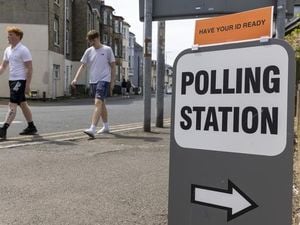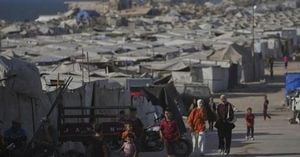Social welfare assistance programs are gaining momentum in Indonesia, aimed at enhancing the living conditions of vulnerable populations. One of the notable initiatives is the free water tank assistance program launched by DKI Jakarta's Perusahaan Umum Daerah (PAM) Jaya. This program primarily targets low-income households lacking proper water storage facilities, particularly those residing in areas with low water pressure.
Director of PAM Jaya, Arief Nasrudin, stated, "Program bantuan ini secara khusus menyasar pelanggan rumah tangga sangat sederhana dan sederhana yang belum memiliki tandon air." The initiative seeks to improve access to clean water, addressing the chronic supply issues faced by many residents. Since its launch in November 2024, the program has delivered 202 water tanks, with plans to reach a total of 1,000 units by completion.
The enthusiastic response from the community highlights the need and appreciation for such efforts. Many residents expressed their gratitude to PAM Jaya for prioritizing their need for clean water, underscoring hopes for enhanced quality of life as they now have improved access to this basic necessity. Arief emphasized the importance of maintaining the water tanks to maximize their long-term benefits. He remarked, "Kami berharap warga yang menerima tandon air ini dapat memanfaatkannya dengan bijak, termasuk menjaga kebersihan dan merawatnya secara rutin.”
On another front, the Dharma Wanita Persatuan (DWP) of the Ministry of Social Affairs (Kemensos) has been active in distributing social rehabilitation assistance (known as ATENSI) and donations from Kitabisa.com to those who require social welfare support. According to DWP's head, Fatma Saifullah Yusuf, "Tujuan kami tidak hanya memberikan bantuan, tetapi juga mempererat hubungan sosial, menguatkan solidaritas, dan memberikan harapan baru bagi saudara serta anak-anak kita yang membutuhkan pertolongan." This initiative is focused on strengthening the social safety net for the underprivileged.
The various assistance packages include everyday needs, mobility aids like wheelchairs, and oxygen tanks for elderly beneficiaries, amounting to Rp 16.1 million for five recipients. Additional support is being provided to disaster victims and people with disabilities, with another significant allocation of Rp 19.2 million directed toward adaptive aids such as hearing devices and entrepreneurial resources.
Highlighting individual compassion, Kitabisa.com is actively involved, providing aid for children suffering from congenital heart defects. Funds raised through generous donations cover their medical expenses, with Istata Luqman of Kitabisa.com declaring, "Harapannya, setelah selesai menjalani pengobatan, mereka bisa kembali ke masyarakat dan menjalani hidup secara mandiri.” These sentiments reflect the deep societal commitment to those who are most vulnerable.
Besides these initiatives, the government is also ensuring the sustainability of Social Assistance (Bansos) programs. Minister of Social Affairs, Saifullah Yusuf, reassured citizens about the allocation of funds for social assistance. He stated, "Malah bansos memungkinkan akan ditambah," emphasizing the government's steadfast commitment to supporting needy populations even as the agency seeks to streamline budgets for enhanced efficiency.
With the 2025 budget for Kemensos set at Rp 79.5 trillion, the proposed allocations focus on social protection programs, including the Family Hope Program (PKH) and the Non-Cash Food Assistance Program (BPNT). Monthly assistance provisions range from Rp 200,000 to Rp 750,000 based on recipient categories, underscoring government priorities to meet basic needs for various community segments.
The government's initiatives are characterized by efficiency improvements within its bureaucracy, which try to remove excess burdens from administrative processes. The Minister likened this to shedding unnecessary "fat" from the bureaucratic mechanism to improve service delivery. He commented, “Efisiensi ini justru menyehatkan. Kalau diibaratkan puasa, semakin lama puasa bisa menghilangkan kanker birokrasi yang menghambat pelayanan.”
Finally, the Kartu Indonesia Pintar (KIP) Kuliah program, providing educational support for economically disadvantaged students, complements these welfare efforts. Financial aid under this program varies per region and targets eligible students, highlighting the government's drive to promote education access.
These multifaceted programs signify concerted efforts not just to provide immediate aid, but also to build capacity and long-term resilience among vulnerable groups. Through these initiatives, Indonesia aims to forge stronger communities and empower individuals to lead healthier lives and achieve their potential.



